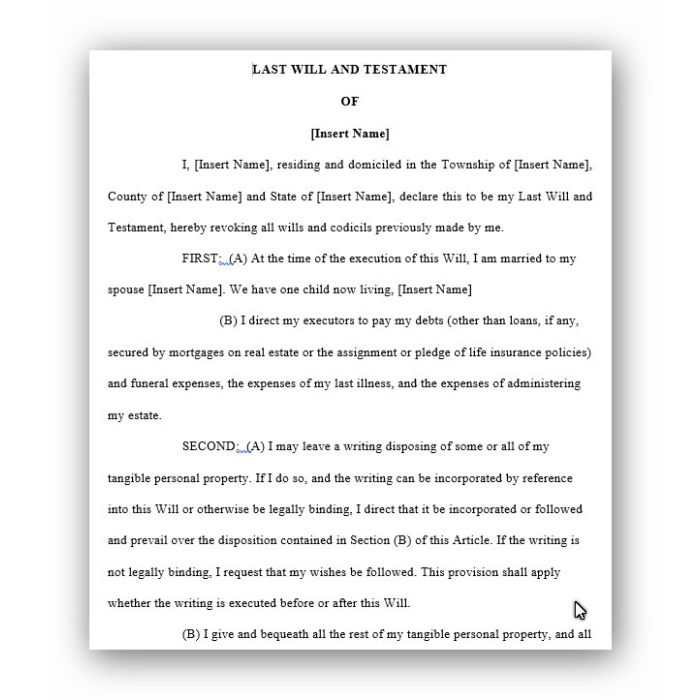Will Outright To Spouse Then Held In Spendthrift Trust (17 Pages)
This Will leaves all property to the surviving spouse. If there is no surviving spouse, the property is left in trust for a child or children, for a duration of 15 years (There is no “magic” to the 15 years here – this Form can be modified to a different duration of years for the trust to run). This is an ideal trust for a client who is concerned about a child, grandchild or any other beneficiary, running through their inheritance.
The trustees are authorized to pay income and principal to or for the benefit of the child, but such payments are capped at $15,000 per year. (There is no "magic" to the $15,000 here - this Form can be modified for different annual amounts.) When the 15 year term is up, the trust property passes outright to the Beneficiary. If the Beneficiary does not survive to inherit, or survives but dies before the 15 years have elapsed, the property passes to the descendants of the testator per stirpes. Article NINTH includes a spendthrift clause.
This Will leaves all property to the surviving spouse. If there is no surviving spouse, the property is left in trust for a child or children, for a duration of 15 years (There is no “magic” to the 15 years here – this Form can be modified to a different duration of years for the trust to run). This is an ideal trust for a client who is concerned about a child, grandchild or any other beneficiary, running through their inheritance.
The trustees are authorized to pay income and principal to or for the benefit of the child, but such payments are capped at $15,000 per year. (There is no "magic" to the $15,000 here - this Form can be modified for different annual amounts.) When the 15 year term is up, the trust property passes outright to the Beneficiary. If the Beneficiary does not survive to inherit, or survives but dies before the 15 years have elapsed, the property passes to the descendants of the testator per stirpes. Article NINTH includes a spendthrift clause.
Author:
Steven G. Siegel is president of The Siegel Group, which provides consulting services to attorneys, accountants, business owners, family offices and financial planners. Based in Morristown, New Jersey, the Group provides services throughout the United States. Mr. Siegel is the author of many books, including: The Grantor Trust Answer Book (2012 and 2013 CCH); CPA’s Guide to Financial and Estate Planning (AICPA 2012); and Federal Fiduciary Income Taxation (Foxmoor 2012). In conjunction with numerous tax planning lectures he has delivered for the National Law Foundation, Mr. Siegel has prepared extensive lecture materials on the following subjects: Planning for An Aging Population; Business Entities: Start to Finish; Preparing the Audit-Proof Federal Estate Tax Return; Business Acquisitions: Representing Buyers and Sellers in the Sale of a Business; Dynasty Trusts; Planning with Intentionally-Defective Grantor Trusts, Introduction to Estate Planning; Intermediate-Sized Estate Planning; Social Security, Medicare and Medicaid: Explanation and Planning Strategies; Subchapter S Corporations: Using Trusts as Shareholders; Divorce and Separation: Important Tax Planning Issues; The Portability Election; Generation-Skipping Transfer Tax: A Comprehensive Review; and many other titles. Mr. Siegel has delivered hundreds of lectures to thousands of attendees in live venues and via webinars throughout the United States on tax, business and estate planning topics on behalf of numerous organizations, including The Heckerling Institute on Tax Planning, CCH, National Law Foundation, AICPA, Western CPE, the National Society of Accountants, the National Tax Institute, Cohn-Reznick, Professional Education Systems, Inc., Foxmoor Education, many State Accounting Societies and Estate Planning Councils as well as on behalf of private companies. He is presently serving as an adjunct professor of law in the Graduate Tax Program (LLM) of the University of Alabama, and has served as an adjunct professor of law at Seton Hall and Rutgers University law schools. Mr. Siegel holds a bachelor’s degree from Georgetown University (magna cum laude, phi beta kappa), a juris doctor from Harvard Law School and an LLM in taxation from New York University Law School.
-
 12 Will Forms (168 Pages)Special Price $299.00 Regular Price $349.00
12 Will Forms (168 Pages)Special Price $299.00 Regular Price $349.00

